A well-structured vegetarian diet can be highly effective for bodybuilding, focusing on high protein sources like tofu, tempeh, and legumes, balanced with macronutrient ratios and optimal meal timing․

Importance of a Vegetarian Diet in Bodybuilding
A vegetarian diet is gaining popularity in bodybuilding due to its potential to support muscle growth while promoting overall health․ Plant-based diets are rich in fiber, antioxidants, and essential nutrients, which aid in recovery and reduce inflammation․ By focusing on high-protein sources like legumes, tofu, and quinoa, vegetarians can meet their protein needs without relying on animal products․ A well-planned vegetarian diet also tends to be lower in saturated fats and cholesterol, contributing to better heart health․ This approach aligns with sustainable and ethical lifestyles, making it a viable choice for bodybuilders seeking a balanced and conscience-friendly way to achieve their fitness goals․
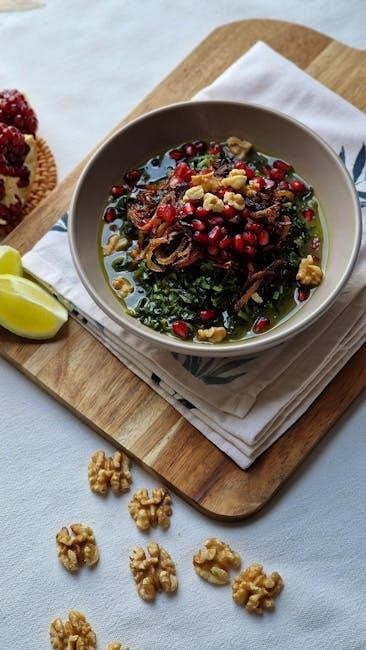
Key Components of a Vegetarian Bodybuilding Meal Plan
A successful vegetarian bodybuilding plan includes high-protein sources, balanced macronutrients, and strategic meal timing to optimize muscle growth and recovery while ensuring nutritional adequacy․
High Protein Sources
For a successful vegetarian bodybuilding diet, incorporating high-protein sources is essential․ Plant-based options like tofu, tempeh, legumes (e․g․, lentils, chickpeas, and black beans), quinoa, nuts, seeds, edamame, and seitan are excellent choices․ These foods provide ample protein to support muscle growth and repair․ Additionally, whole grains like brown rice and oats contribute to overall protein intake․ Aim to include a variety of these sources in each meal to meet your daily protein goals, which should be around 1․2–1․6 grams of protein per kilogram of body weight; Proper planning ensures you receive all essential amino acids for optimal performance․
Meal Frequency and Timing
Maintaining a consistent meal frequency and proper timing is crucial for muscle growth and recovery in a vegetarian bodybuilding diet․ Aim for 5-6 smaller meals throughout the day to keep your metabolism active and prevent excessive hunger․ Space meals every 2-3 hours, ensuring balanced macronutrients at each sitting․ Key times include breakfast, a pre-workout snack, post-workout recovery meal, and dinner․ This approach helps maintain a positive nitrogen balance and supports muscle synthesis․ Additionally, staying hydrated and timing meals around workouts can enhance performance and recovery․ Adjust meal timing based on your schedule and training routine to maximize results․
Macronutrient Balance
A well-balanced vegetarian bodybuilding diet requires careful attention to macronutrients․ Protein intake should be prioritized, aiming for 1․2-1․6 grams per kilogram of body weight daily to support muscle growth and repair․ Carbohydrates, such as whole grains, legumes, and sweet potatoes, provide energy for workouts and recovery, while healthy fats like avocados, nuts, and seeds support hormone production․ Striking the right balance ensures sustained energy levels, optimal recovery, and muscle synthesis․ Adjust macronutrient ratios based on individual goals, whether bulking or cutting, to maximize results․ Proper planning prevents nutrient deficiencies and supports long-term success in vegetarian bodybuilding․
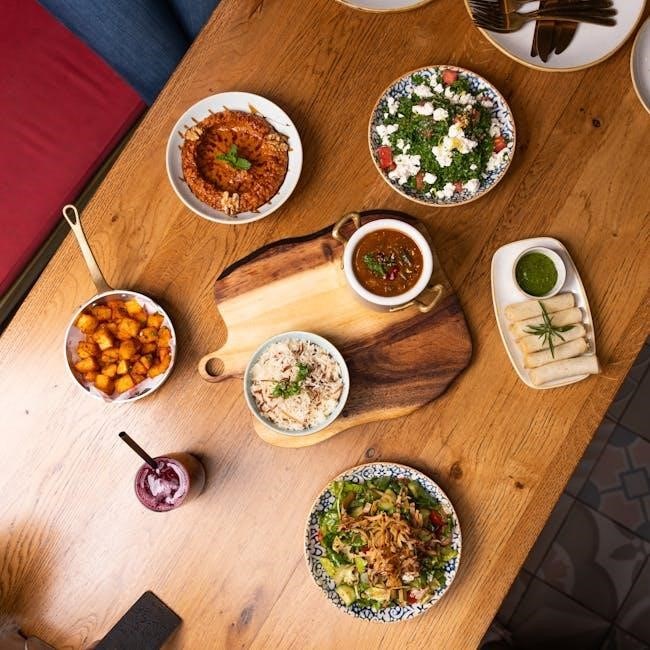
7-Day Vegetarian Bodybuilding Meal Plan
This structured, high-protein plan provides balanced nutrition, including complex carbs, healthy fats, and essential nutrients․ Customize it to suit bulking or cutting goals with a downloadable PDF․
Day 1: Breakfast, Lunch, Dinner, and Snacks
Breakfast: Oatmeal with protein powder (30g protein) and mixed berries, topped with almonds․
Lunch: Quinoa salad with chickpeas (20g protein), avocado, and steamed vegetables․
Dinner: Lentil stir-fry (25g protein) with brown rice and broccoli․
Snacks: Apple slices with peanut butter (8g protein) and a handful of mixed nuts (10g protein)․
This balanced plan provides approximately 93g of protein, meeting bodybuilding needs while staying vegetarian․
Day 2: Breakfast, Lunch, Dinner, and Snacks
Breakfast: Tofu scramble with spinach, tomatoes, and whole-grain toast (22g protein)․
Lunch: Chickpea and spinach curry with brown rice (25g protein)․
Dinner: Veggie burger patty (28g protein) with roasted vegetables and quinoa․
Snacks: Greek yogurt with honey (15g protein) and a handful of almonds (8g protein)․
This meal plan delivers a balanced mix of protein, carbs, and fats, totaling 98g of protein for muscle growth and recovery․
Day 3: Breakfast, Lunch, Dinner, and Snacks
Breakfast: Protein oatmeal with berries and chia seeds (20g protein)․
Lunch: Lentil and chickpea salad with avocado and whole-grain crackers (28g protein)․
Dinner: Veggie stir-fry with tempeh and quinoa (30g protein)․
Snacks: Apple slices with almond butter (8g protein) and steamed edamame (17g protein)․
This meal plan provides a balanced intake of protein (103g total), healthy fats, and complex carbs, supporting muscle growth and energy needs․
Day 4: Breakfast, Lunch, Dinner, and Snacks
Breakfast: Protein smoothie bowl with spinach, banana, and hemp seeds (25g protein)․
Lunch: Grilled tofu and veggie wrap with hummus and quinoa (30g protein)․
Dinner: Lentil and vegetable curry with brown rice (28g protein)․
Snacks: Greek yogurt with mixed nuts (15g protein) and roasted chickpeas (12g protein)․
This day’s meals provide a total of 110g of protein, ensuring muscle recovery and growth while maintaining a balanced intake of carbs and healthy fats․
Day 5: Breakfast, Lunch, Dinner, and Snacks
Breakfast: Oatmeal with protein powder, almond butter, and blueberries (30g protein)․
Lunch: Chickpea and quinoa salad with avocado and tahini dressing (25g protein)․
Dinner: Stuffed bell peppers with black beans, quinoa, and corn (28g protein)․
Snacks: Cottage cheese with pineapple (18g protein) and a handful of mixed nuts (8g protein)․
This day’s meals offer a variety of plant-based protein sources, ensuring 111g of protein to support muscle growth and recovery․ Balanced with complex carbs and healthy fats, these meals keep energy levels steady and promote overall fitness goals․
Day 6: Breakfast, Lunch, Dinner, and Snacks
Breakfast: Tofu scramble with spinach, mushrooms, and whole-grain toast (22g protein)․
Lunch: Lentil and edamame stir-fry with brown rice (29g protein)․
Dinner: Stuffed zucchini boats with seitan, quinoa, and marinara sauce (30g protein)․
Snacks: A protein smoothie with pea protein, banana, and almond milk (20g protein) and roasted edamame (10g protein)․
This day’s meals provide a diverse mix of plant-based proteins, totaling 111g of protein, while balancing carbs and fats to fuel muscle growth and recovery․
Day 7: Breakfast, Lunch, Dinner, and Snacks
Breakfast: Tofu scramble with bell peppers, onions, and whole-grain toast (25g protein)․
Lunch: Chickpea and quinoa salad with avocado and a lemon-tahini dressing (28g protein)․
Dinner: Stuffed bell peppers with seitan, black beans, and quinoa (32g protein)․
Snacks: Roasted edamame (15g protein) and a protein bar (12g protein)․
This final day provides a balanced mix of plant-based proteins, totaling 112g of protein, ensuring sustained energy and muscle repair․ Each meal is nutrient-dense, with complex carbs and healthy fats for optimal performance․ Completing this 7-day plan demonstrates commitment to a well-rounded vegetarian bodybuilding diet․

Sample Vegetarian Bodybuilding Meal Plan PDF Download
Download a customizable PDF featuring a 7-day high-protein vegetarian meal plan, complete with recipes, grocery lists, and nutrition info to support muscle growth and recovery․
Features of the PDF
The PDF includes a 7-day high-protein vegetarian meal plan, customizable to suit individual calorie and protein needs․ It features detailed recipes, a grocery list, and nutritional information for each meal․ The plan emphasizes balanced macronutrients, with a focus on plant-based protein sources like tofu, tempeh, and legumes․ Additionally, it provides tips for meal prep, portion control, and sustainability․ The PDF is designed to support muscle growth and recovery while maintaining a plant-based lifestyle․ It’s a comprehensive guide for bodybuilders seeking a structured and nutritious vegetarian diet plan․
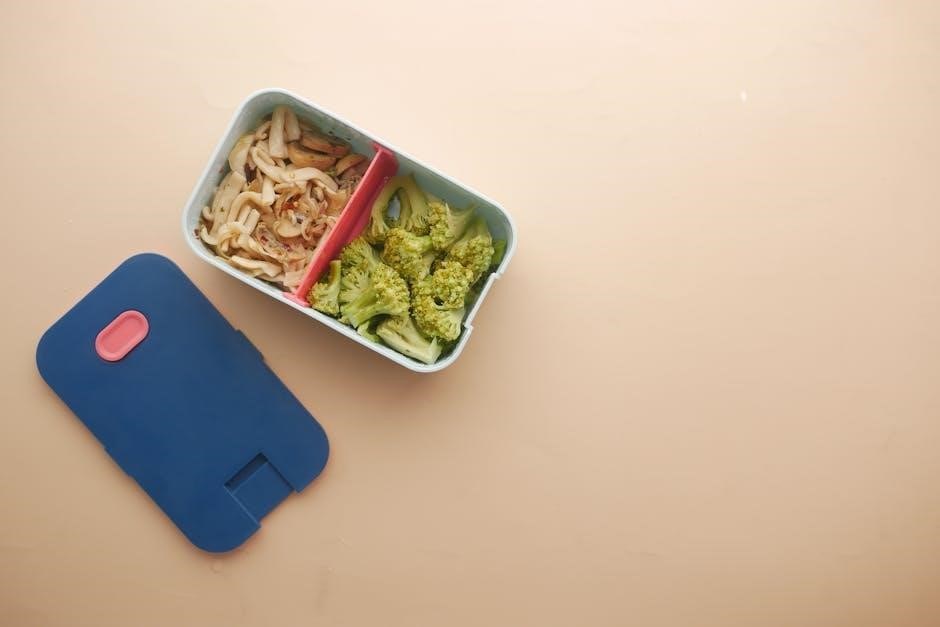
Grocery List for the Meal Plan
Essential items include high-protein foods like tofu, tempeh, legumes, quinoa, nuts, and seeds․ Stock up on whole grains, leafy greens, fruits, and healthy fats like avocados․
Essential Items
A well-rounded vegetarian bodybuilding grocery list should include high-protein staples like tofu, tempeh, lentils, chickpeas, and quinoa․ Whole grains such as brown rice, oats, and whole-grain bread are crucial for sustained energy․ Healthy fats like avocados, nuts, and seeds (e․g․, almonds, chia seeds) support hormone production and satiety․ Don’t forget leafy greens (spinach, kale) and colorful vegetables for vitamins and antioxidants․ Legumes like black beans and kidney beans are excellent for protein and fiber․ Lastly, include plant-based milk (e․g․, almond or pea milk) and optional supplements like plant-based protein powder for convenience․ These items ensure a balanced and nutrient-dense meal plan tailored for muscle growth and recovery․

Vegetarian Bodybuilding Recipes
Focus on high-protein, plant-based dishes like tofu stir-fries, lentil curries, quinoa salads, and chickpea bowls․ These recipes are tailored for muscle growth and recovery, ensuring balanced nutrition․
Breakfast Recipes
Start your day with protein-packed vegetarian breakfasts designed for bodybuilding․ Try high-protein oatmeal with peanut butter, chia seeds, and berries․ Whip up a vegan protein smoothie with plant-based protein powder, bananas, spinach, and almond milk․ Opt for tofu scramble with turmeric, garlic, and veggies, served with whole-grain toast; Include quinoa breakfast bowls mixed with nuts, seeds, and fresh fruits․ For convenience, prepare overnight protein chia pudding with coconut milk and hemp seeds․ These recipes ensure sustained energy and muscle recovery, providing balanced macronutrients for optimal performance․
Lunch and Dinner Recipes
For a satisfying and protein-rich vegetarian meal plan, incorporate dishes like stuffed bell peppers with quinoa, black beans, and veggies․ Try lentil curry served over brown rice or chickpea salad with avocado and whole-grain wraps․ Opt for vegetable stir-fries with tofu, tempeh, or seitan, paired with brown rice or noodles․ Include grilled portobello mushroom burgers or veggie-packed chili for hearty, muscle-building meals․ These recipes are designed to deliver balanced macronutrients, ensuring ample protein and energy for bodybuilding while promoting muscle growth and recovery․
Snack Options
Keep your energy levels high with protein-rich snacks like nuts, seeds, and Greek yogurt with berries․ Protein smoothies made with plant-based protein powder, spinach, and banana are quick and nutritious․ Veggie sticks with hummus or guacamole provide healthy fats and fiber․ For a convenient option, opt for energy balls made from oats, nut butter, and chia seeds․ These snacks are designed to support muscle recovery and growth while keeping you satisfied between meals․ Incorporate them into your routine to ensure you meet your daily protein and calorie needs for optimal bodybuilding results․
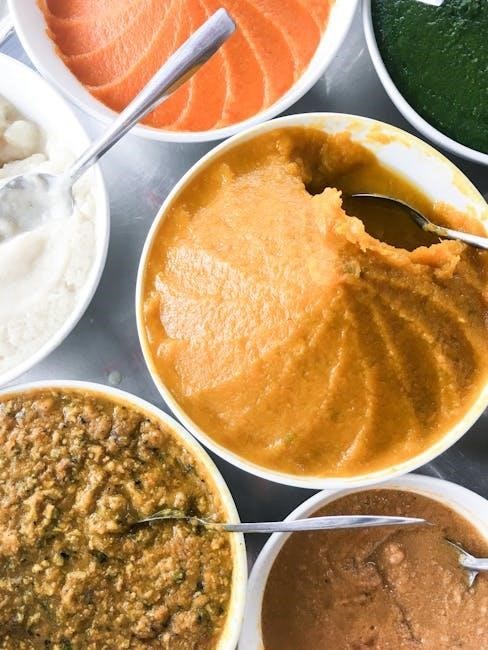
Sustainability and Long-Term Maintenance
Maintaining a vegetarian bodybuilding diet long-term requires consistency, variety, and adaptability․ Regular meal prepping, incorporating diverse protein sources, and adjusting macronutrient ratios ensure sustained progress and motivation․
Tips for Continued Success
For long-term success with a vegetarian bodybuilding diet, consistency and adaptability are key․ Plan meals in advance to avoid nutritional gaps and ensure variety․ Track protein intake and adjust calorie needs based on progress․ Incorporate diverse plant-based protein sources like tofu, tempeh, and legumes to maintain muscle growth․ Stay hydrated and prioritize whole, nutrient-dense foods over processed alternatives․ Adjust macronutrient ratios as fitness goals evolve, and seek inspiration from new recipes to keep meals engaging․ Regularly monitor progress and consult with a dietitian to fine-tune your plan․ By staying committed and open to adjustments, you can sustain a thriving vegetarian bodybuilding lifestyle․

Common Mistakes to Avoid
Neglecting protein intake, improper meal timing, and relying on processed foods are common pitfalls․ Ensure balanced macronutrients and whole-food focus for optimal muscle growth and overall health․
Pitfalls in Vegetarian Bodybuilding
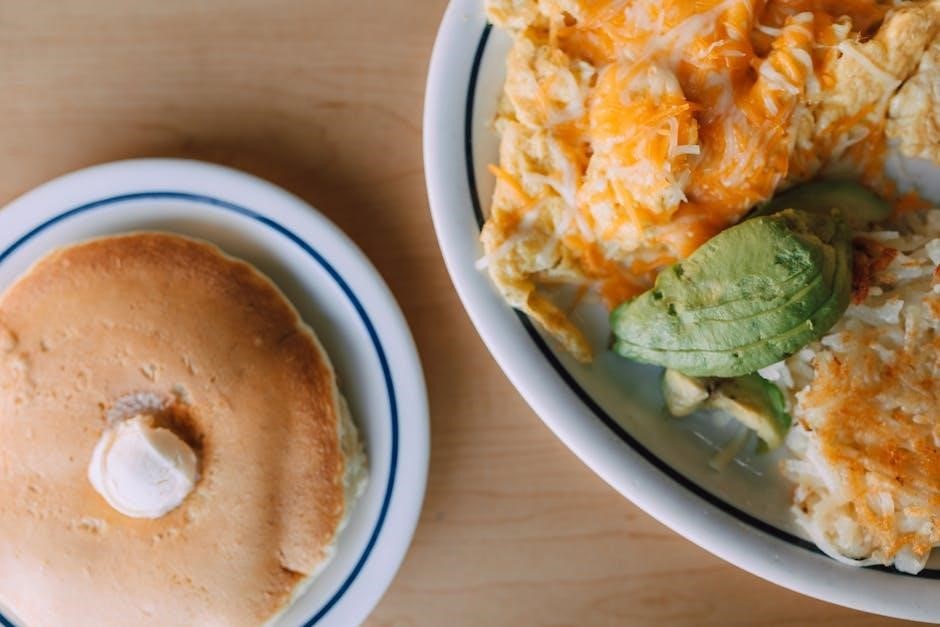
One common pitfall is inadequate protein intake, as plant-based sources may lack essential amino acids․ Relying too heavily on processed foods can lead to nutrient imbalances․ Additionally, insufficient calorie consumption can hinder muscle growth, while over-reliance on supplements may neglect whole-food benefits․ Poor meal timing and failure to balance macronutrients can also impede progress․ It’s crucial to plan meticulously, ensuring a variety of whole, nutrient-dense foods to meet protein, carb, and fat needs for sustained muscle development and overall health․ Avoiding these missteps is key to a successful vegetarian bodybuilding journey․
A well-planned vegetarian bodybuilding meal plan empowers you to achieve your fitness goals while maintaining a healthy, sustainable lifestyle․ Stay consistent and embrace the power of plant-based nutrition!
Final Thoughts and Encouragement
Adopting a vegetarian bodybuilding meal plan is a powerful way to fuel your fitness journey while aligning with your values․ By focusing on high-protein plant-based foods and careful meal planning, you can achieve significant muscle growth and overall health․ Remember, consistency is key—stick to your plan and monitor your progress․ Don’t hesitate to explore new recipes and adjust portions as needed․ Downloading a PDF meal plan can provide structure and inspiration, helping you stay on track․ Believe in your potential and embrace the transformative power of a well-designed vegetarian diet․ Your dedication will yield results, both in the gym and beyond!
